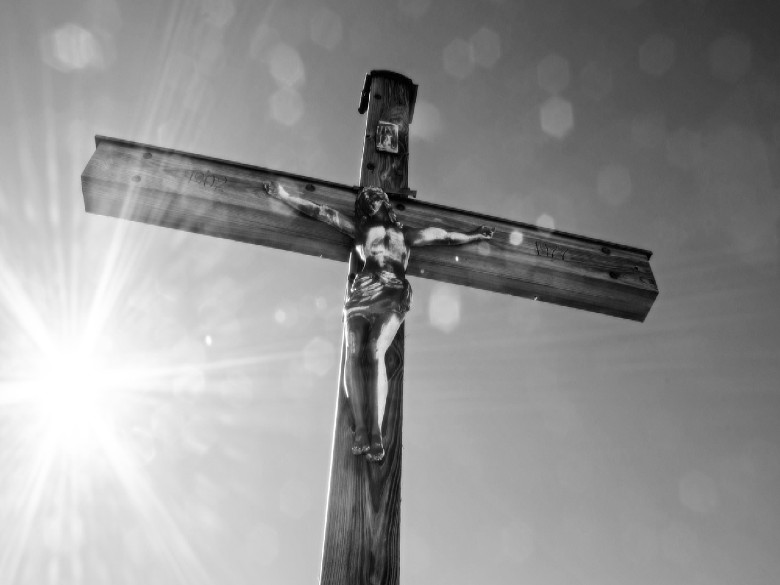The Humble Life: On the cross, Jesus’ words, “I am thirsty” demonstrate his humilty and just how low he has gone for the sake of humanity.
If you have missed my previous Holy Week entries, which are focused on Jesus’ seven words on the cross, you can click the links below:
These words are deeply ironic given the imagery of John’s gospel: Jesus is the source of “living water.” Jesus is the one who satisfies thirst. Here, he is the one whose thirst must be quenched.
Let’s look back at the rest of John to see how Jesus is described throughout the book. We start in chapter 1. John describes Jesus as the Word who was with God and is God. John begins his Gospel by offering the highest description of someone possible.
Later in John 4, Jesus meets a Samaritan woman at a well. This is the only other time in John’s Gospel Jesus asks for a drink. Here he tells the Samaritan woman:
“Everyone who drinks from this water will get thirsty again. But whoever drinks from the water that I will give him will become a well of water springing up in him for eternal life.”
Here we see Jesus declaring himself the source of living water that leads to eternal life. At a later point in this conversation, Jesus reveals that he is the Messiah.
In John 7, Jesus cried out,
“If anyone is thirsty, let him come to me and drink. The one who believes in me, as the Scripture has said, will have streams of living water flow from deep within him.”
Once again, Jesus is positioned as the source of salvation and life, this time alluding to the Holy Spirit who he will send to those who trust in him.
John presents Jesus as lofty in position and power. He is God himself and he himself is the source of salvation and eternal life. But in chapter 19, we see God himself, the Word, the source of living water, the light of the world reduced to the status of a criminal condemned to die on a Roman cross in need of drink himself. Jesus is a lesson in downward mobility. In John’s gospel, he has gone from the highest being possibly imagined to be treated as the lowest of the low.
Jesus’ character arc is well described by Paul in Philippians 2, describing Jesus as someone who
“did not consider equality with God as something to be exploited. Instead, he emptied himself by assuming the form of a servant, taking on the likeness of humanity. And when he had come as a man, he humbled himself by becoming obedient to the point of death—even to death on a cross.”
Jesus is pulling what we might call a reverse Cinderella—instead of going from rags to riches, he is going from riches to rags.
But it is important to note that Jesus is not a victim of circumstance. These things did not just happen to him. He chose this route. He chose to go from riches to rags, from Godhood to condemned criminal. He chose humility. Jesus lived the humble life, and nowhere was this more evident than on the cross. If we want to live Crucifixed lives, lives shaped by the cross of Jesus, then we too must live the Humble Life.
Author interruption: For holy week, I am posting on the final seven words of Jesus as he was crucified. You can also check out the podcast I host with my good friend Matt on Spotify. You can also join me on Facebook or follow me on Twitter and Threads @revsteve83

HUMILITY DEFINED
First of all, what exactly is humility? In his excellent new book, Humility Illuminated, North Park Seminary Dean Dennis Edwards writes,
“Humility is a way of life rooted in submission to God and is demonstrated in actions that foster mutuality rather than competition.”
In other words, humility is a life devoted to moving toward God through obedience and toward others through service. It is a life that chooses to be lowly out of deference to God and to others and in doing so, fosters cooperation and community within the body of Christ.
Humility does not seek its own interests or pursue its own vain ambitions. It doesn’t try to make much out of oneself but trusts that God will exalt the humble. As Proverbs 3:34 says, God, “mocks those who mock, but gives grace to the humble.” James, bouncing off of this proverb, writes, “Humble yourselves before the Lord and he will exalt you.” God thwarts the efforts of the mockers, or the proud, who set themselves up above all others but he will lift up those who humble themselves. Repeatedly, in Scripture, the message is “Be humble or be humbled.”
Humility was perhaps the identifying mark of a Christian in the early church. Ancients typically considered humility to be a useless trait, worthy of mockery. Pagan society had no use for humility as it valued honor and ambition above all else. Eve-Marie Becker writes that “in early Christianity humility was regarded as a virtue that was unknown in the pagan world” and was therefore “a Christian identity marker.” In fact, one early Christian writer wrote that humility was “a sign of what is Christian.” Humility was a sign of what is Christian because it was a defining characteristic of Christ himself.
HUMILITY EXEMPLIFIED: Submission to God
Of all the words Jesus utters on the cross, “I am thirsty” is perhaps the most mundane, on a surface level at least. At first glance, it does not seem to be imbued with any deep meaning; Jesus is in the midst of a brutal execution, and he becomes thirsty. Seems like a very normal, very human response to his situation.
There is, however, much more going on here than just Jesus’ thirst, but I don’t want to ignore the face value meaning of what’s happening to Jesus. He is thirsty. Thirst is a very normal human experience in the best of conditions. Here, Jesus is thirsty because he has been beaten and whipped and nailed to a cross. After losing so much bodily fluid, of course Jesus is dehydrated. Jesus is enduring physical torture and torment the likes of which few people ever have. Of course he’s thirsty. He is thirsty because he is being crucified. And he is being crucified because he is submitting to God’s will.
Jesus Chooses the Father’s Cup
In John 18, we are told of Jesus’ arrest. Judas led a detachment of soldiers, along with Pharisees and some officers from the chief priests. Peter drew a sword and cut off the ear of the high priest’s servant. Jesus responded to this by commanding Peter, “Put your sword away! Shall I not drink the cup the Father has given me?”
Here again is some thirst imagery. The cup given to Jesus by his Father was his crucifixion. God’s plan for Jesus was to go to the cross. In going to the cross, willingly, Jesus is choosing to submit to God’s will. When Jesus says, “I am thirsty” it is because he is drinking the cup his father has given him.
Again, with Philippians 2 in mind, we remember that Jesus was divine. Jesus is the creator of the whole world, and here he is being killed by his very creation. He has lowered himself, emptied himself and has subjected himself to becoming a man and dying a criminal’s death on the cross. Here is the source of living water that quenches a person’s spiritual thirst begging for some water as he slowly dies. “I am thirsty” reveals Jesus, the highest being imaginable reduced to the lowliest state possible. It does not reveal a Jesus who is being a humbled, but a Jesus who is being humble. He has chosen this path for it is the only way for him to redeem humankind. He is choosing to submit to God in obedience.
Yielding to God
Jesus exemplifies for us what it means to submit to God. According to Dr. Edwards,
“Biblical humility’s trajectory begins with submission to God.”
Our starting point for living the Humble Life is yielding our will to God’s will. It is choosing to trust that God is smarter and wiser and more loving than us and that his path is better than any we can come up with on our own.
A yield sign on the road is a perfect illustration for what submission to God looks like. When we approach an intersection with a yield sign, we check to see if another car is coming down the cross street. If there is traffic coming down that cross street, then we stop and give them the right of way. We are yielding the right of way to the other car and only once it has passed can we go.
When we submit to God, we are yielding our right to call the shots and giving God the right of way in our lives. We are choosing his path, his ways, his actions over our own. We are humbly choosing to yield to God control over our lives.
This is where humility starts. Before humility branches out into its corporate manifestation it begins with the individual choosing to abdicate the throne of his or her life and allowing God to reign instead. Jesus perfectly exemplifies this on the cross.
Jesus Given Sour Wine
In response to Jesus saying, “I am thirsty,” the soldiers soak a sponge in some sour wine and hold it up to Jesus with a branch. The sour wine was a common drink for laborers and soldiers, and it was probably at the scene of the crucifixion for the soldiers’ benefit. Clean, potable water could be hard to come by in these days and the fermented wine would have been free of any impurities which is why it was used to quench the thirst of common workers and soldiers. This sour wine would have been cheap and would have tasted sharp and vinegary.
It is doubtful that the soldiers felt any compassion toward Jesus; they were included among those mocking Jesus earlier. In fact, the best interpretation of their action would be that they were preventing Jesus from dying too quickly. Crucifixion was meant to be a slow, agonizing death, they couldn’t have Jesus blacking out of dehydration. So they soaked a sponge in some wine and offered it to Jesus.
This is the cup Jesus has been given by his father. He is choosing to drink it despite all its suffering. Jesus is thirsty because has chosen to be crucified, and he has chosen to be crucified because he has chosen to submit to God.
HUMILITY EXEMPLIFIED: Actions of Mutuality
But there is another reason why Jesus has chosen to be crucified. In addition to submitting to God’s will, Jesus chose to be crucified in order to move toward us and foster mutuality with us. Jesus has chosen not to exploit his equality with God for his own gain and his own ambitions. He has chosen not to compete with us, but to bring us into cooperation and mutuality with him.
As John tells us, this has happened to fulfill Scripture, particularly Psalm 69:21:
“They put gall in my food and gave me vinegar for my thirst.”
David wrote Psalm 69 as the lament of a righteous and innocent man being made to suffer by his enemies. In the midst of his distress, signified here by his thirst, his enemies, instead of offering him water, gave him vinegar as a way of adding insult to injury or rubbing salt in an open wound or kicking him while he was down. On the cross, Jesus identifies with David in his suffering and ascribes it to his predicament on the cross. While he was suffering in numerous ways, he too was offered vinegar—or vinegar-tasting wine—to drink.
Jesus’ thirst is representative of all the suffering he is enduring, and we are told in Scriptures that his suffering would be for us. Isaiah 53:4-5 says,
“Surely he took up our pain and bore our suffering, yet we considered him punished by God, stricken by him, and afflicted. But he was pierced for our transgressions; he was crushed for our iniquities; the punishment that brought us peace was on him, and by his wounds we are healed.”
This suffering Jesus is enduring was for us. It was done to cleanse us of our sins. It was done to destroy the power that sin held over us. Jesus is not just humbly submitting to God but he is humbly serving us so that we can be forgiven our sin and restored to the family of God.
On the cross, Jesus gives us an example of humility directed toward others. He is laying down his ambitions for the sake of the community of God, so that there could be a community of God through faith in Jesus.
Jesus’ thirst and the offering of sour wine fulfill Scripture. Jesus’ thirst represents all the suffering he is enduring on the cross. Jesus, in his humility, was willing to be humiliated in order to submit to God and to serve the needs of humanity by bearing the cross.
HUMILITY REWARDED
If you will remember however, God shows grace to the humble. If we humble ourselves before the Lord, he will lift us up. Yes, Jesus emptied himself to become a man and die on the cross, but the story doesn’t end there—God exalts Jesus to such a position that every knee will bow at his name.
Psalm 69, just 11 verses after the thing about the vinegar, makes this point as well. From the New Living Translation,
“The humble will see their God at work and be glad.”
God opposes the proud but gives grace to the humble. Rather than striving for greatness and the attainment of our own ambitions, we should seek to be lowly before God and people and trust that he will lift us higher than we could have gone on our own. God promises us that our humility will lead to our exaltation, but not out of our own effort, but rather because of his gift.
Jesus’ route to glory was through the cross. His journey upwards required him to go downwards. God exalted him because of his humble obedience to the will of the Father and his humble sacrifice in service of humanity. Our own path towards glory also takes us through humility.
HUMILITY LIVED
A Repentant Heart
First, humility requires a repentant heart before God. In moving toward God and learning to submit to him, we are reminded of our failure to live up to God’s standards. As Dennis Edwards writes,
“Repentance is the recognition of human frailty evident in our inability to be and do all that we should, regardless of the amount of physical and emotional striving.”
In order to be humble, one must be repentant, and in order to be repentant, one must be humble. He cites 2 Chronicles 7:14, “If my people who are called by my name humble themselves, pray, seek my face, and turn from their wicked ways, I will hear from heaven, and will forgive their sin and heal their land.” In order to approach God and relate to him, we need to receive his forgiveness and healing therefore we must first humble ourselves before him with repentant hearts. Jesus’ death on the cross has secured the promise of forgiveness for those who turn to God in humility and repent.
Cooperation > Competition
Second, humility requires cooperation and community over against competition and personal ambition. Humility requires us to confront the reality that we are nothing without other people. Nobody is “self-made.” We all get help from someone and for the disciple of Jesus, that help comes primarily through a community of believers that seek to do what is mutually beneficial and edifying for one another. We recognize that instead of trying to do it on our own that we are indeed better together.
I have been gifted by the Spirit to do certain things well in service of the church. However, I would be a fool to not recognize the many more gifts that the Spirit has chosen NOT to give me. But I need those gifts to be exercised in my life. So I’m led to a community, a church, of Spirit-gifted individuals so that I might gain from their giftedness and service to me as I seek to use my gifts for their benefit.
Humility and Worship
Third, and this is not an exhaustive list, but this is where submission to God and mutuality with one another comes together: humility should lead us to worship and humility should infuse our worship. I say “our” because worship is a corporate discipline, something we do together. When we gather together for worship, our hearts should be humble before God so that we might see his worthiness of our praise and devotion. Our hearts should also be humble toward one another. We should be a welcoming space that allows everyone the opportunity to connect with God. We should be gracious toward one another and extend to one another freedom to worship in a way that is true to oneself.
In college, I estimate that I attended well over 200 chapel sessions. I have vague memories of a handful of them. I only remember two specific exhortations from my four years of mandatory, thrice-weekly chapel sessions. In one of those instances, the speaker was confronting us about our attitudes in chapel or in church services and I’ll never forget what he said: “Some of you complain that a sermon didn’t speak to you or that you didn’t get anything out of a sermon. But maybe that sermon wasn’t for you. Maybe it was for the person next to you. Can you be joyful that someone heard a message that they needed to hear even if it didn’t resonate with you?” It’s just reality that not every sermon will speak to you or inspire you. Not every word is going to be a word that you necessarily need to hear. When that happens, can we rejoice that it might have spoken to the person next to us? Can we humbly say, well, perhaps God wasn’t trying to get my attention today, but I’m sure glad he was speaking to someone else?
I saw a joke recently where a man came up to the pastor after a church service. He was grumpy and growled at the pastor, “I didn’t get anything out of worship today.” The pastor responded, “That’s OK, we weren’t worshiping you.” Can we remember, as we gather, who it is we are worshiping? Can we gather every Sunday morning out of a desire to submit to God and give him glory and a desire to edify and serve our brothers and sisters? And hopefully, with that mindset, God will lift you up and encourage you each time you gather here.
Jesus lived the Humble Life. He chose downward mobility over seeking his own glory. He chose the cross and all its sufferings for our sake, for our benefit, and out of obedience to God. Can we remember to follow his example? Can we remember to humble ourselves before God and trust that he will lift us up, just as he lifted up Christ? Can we move toward God in repentance, move toward cooperation rather than competition, and move toward a worship with a spirit of humility? Can we live the Humble life?











